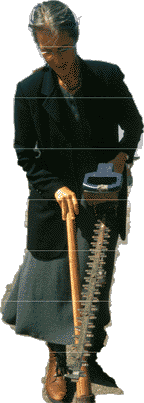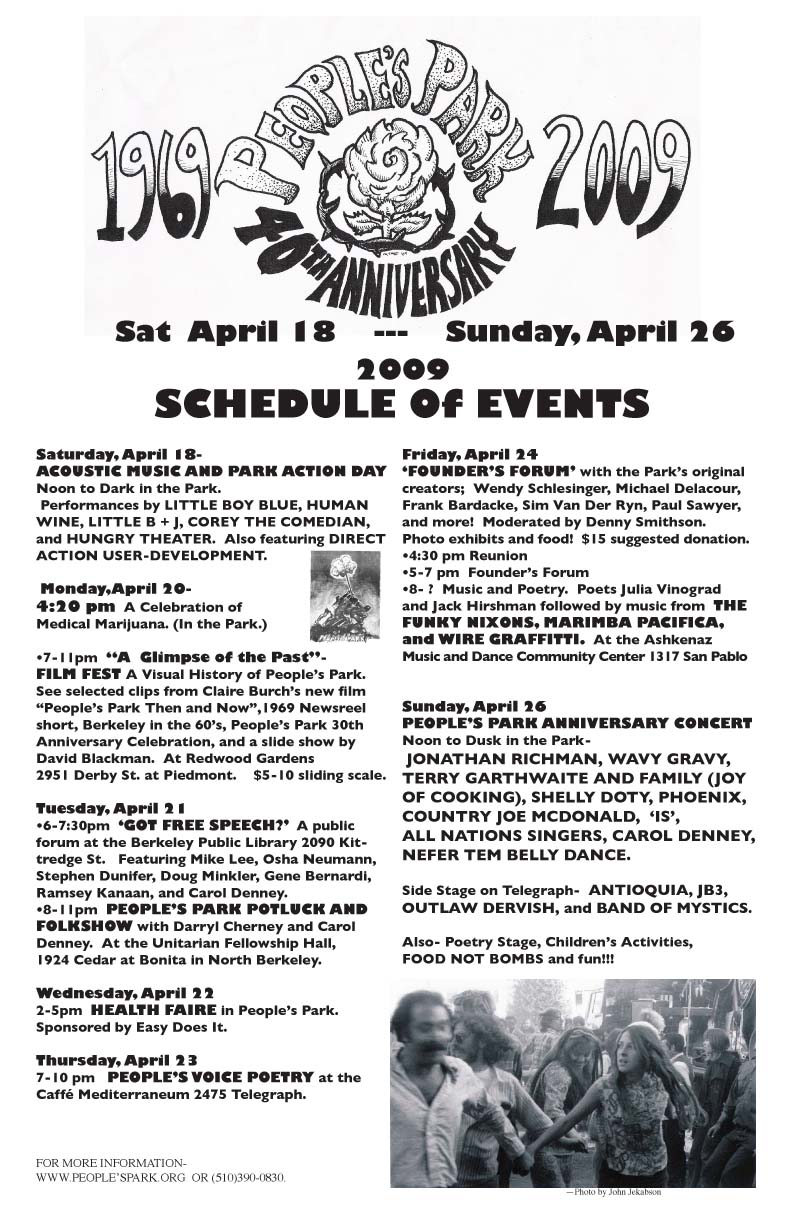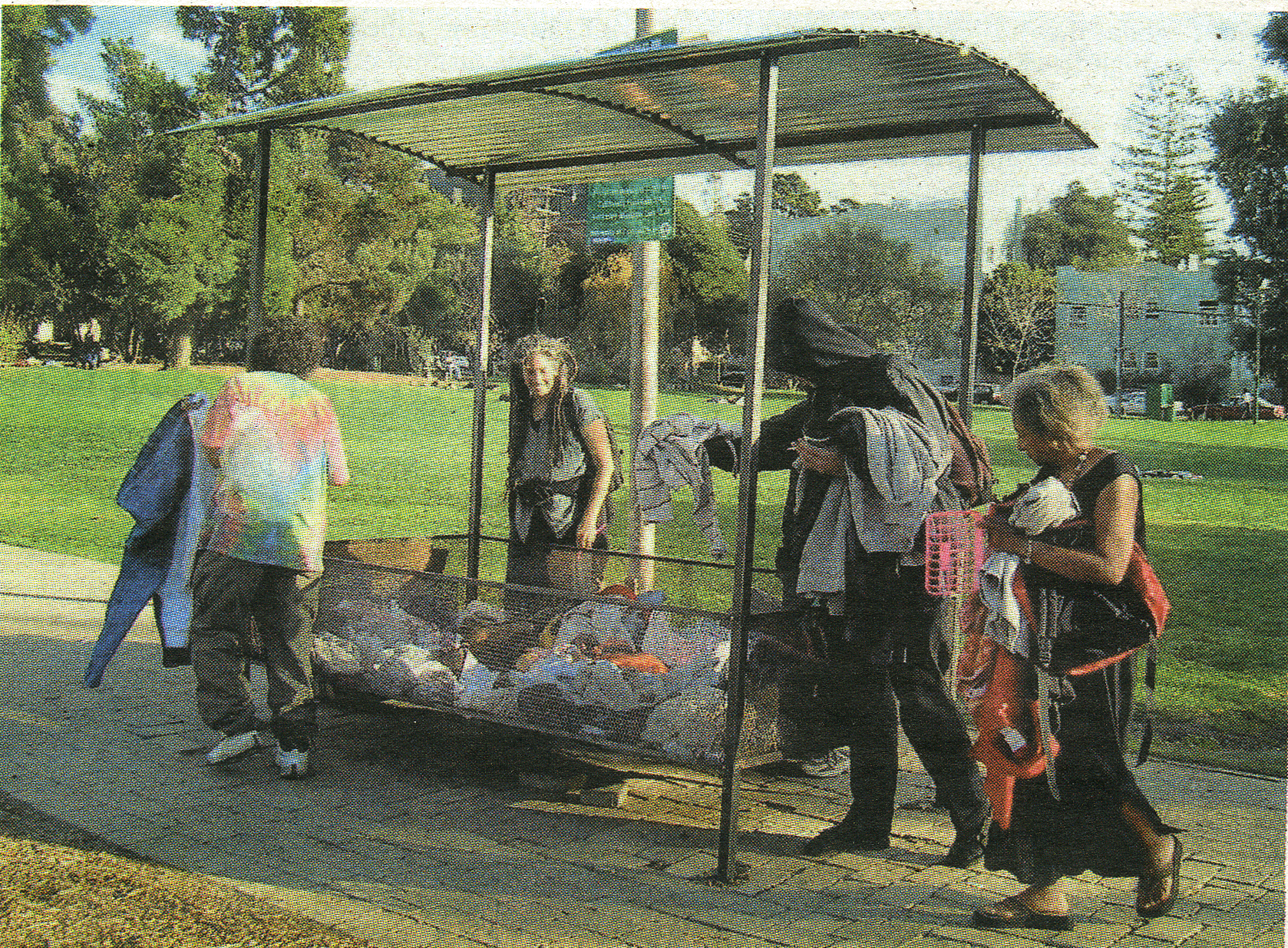Return to home page
Return to gratuitous commentary page
Return to SLAPP-suit page
People's Park Today

 I wrote "Park Dream" three years ago (today is March 30th, 2009) and my dream has come true.
I wrote "Park Dream" three years ago (today is March 30th, 2009) and my dream has come true.
The 40th Anniversary of People's Park this year will have music on the park stage, and the town will have lots of additional events such as:
April 18th, People's Park: "Spring Cleaning at People's Park" day. Bring something to plant, or something to eat, or something to play (like a fiddle) or just come and help fix up the park for its 40th Anniversary. Acoustic music very much appreciated.
April 21st, 6:00 - 7:30 pm, "Got Free Speech" panel and community discussion at Berkeley Library's 3rd floor meeting room, followed by:
April 21st, 7:00 - 11:00 pm, "People's Park 40th Anniversary Potluck and Folk Show" featuring Darryl Cherney, Carol Denney, Clyde Leland, and a sparkeling lineup which could include you - email me at cdenney@igc.org and I'll hook you up.
and much, much more. Thank you, everybody, who brought the park back to life and back to its roots. We need to celebrate together so we know who we are. Then when the university of California comes to destroy the park, as they always will, we will be there to stop them, as we always do, and we'll have the time of our lives while we do it.
Carol Denney
Park Dream 3-30-06
I am so dispirited by the rudeness I saw at the last People's Park meeting I attended that the only comfort I could find was in promising myself that I could take a break from it.
I do have a dream for the park, maybe for next year. I'm hoping that just for one year the park could return to civil rights and anti-war roots. The park began as a garden, no question about that, and remains a beautiful garden. But it was the resistance to the war, to the university's efforts to suppress free speech, and to police violence that centered and defined the park's identity.
We miss an enormous opportunity by not utilizing the stage to its fullest to teach people about this, and rob the community of a forum that has no parallel. What happens in People's Park on the park's anniversary helps define the park itself, and sends a message to the university, which would love to see the stage become poorly used, poorly maintained, and eventually unimportant. I can't be part of a gradual erosion of its importance, and watch it inexplicably shut down for portions of the day and booked in a haphazard or elitist manner, so that important community concerns go unrepresented and fresh creative energy has no chance to participate.
I appreciate that some of the people who assume controlling positions over different aspects of the anniversary celebration might be tired of their roles, but it baffles me that those people don't find a fresh role to play and give their old role to someone who might enjoy it. Two of these roles I believe might benefit from redefinition are booking and painting the stage, but the suggestions I've made regarding these things have been so summarily dismissed I'm just going to write them down and give up.
Booking the stage:
Let's be more creative. We don't have to choose between three or four big super groups versus drooling at the mouth sign-up-at-the-last-minute nutcases who can't sing. This town is RICH with music from all corners of the world, dance, folk, punk, rock, jazz, klezmer, you name it. If the park's stage hasn't represented a bigger selection of music, it's because nobody has been putting much thought into it since the days David Nadel and I did the booking, or indulging in mythology like more punk equals more politically committed people, which is ludicrous. It is hard to turn down people with no talent, but that's the job. I'll keep it brief, but I suggest:
Shorter spots: this way more musicians get to participate and nobody sucks for long. Any band that won't play for a shorter stage spot can play some other day, some other place, and most bands know how to keep a tight set-up and play a short spot (15-20 minutes) if they have to, during which you can have speakers and single-instrument or double instrument groups or speakers.
More variety: obviously, more diversity, more communities represented, etc.
Less volume: cranking for the sake of offending the neighborhood sucks. We ought to be putting bouquets on the doorsteps of the neighbors for putting up with us. People can collect around the stage to hear the music, enabling smaller acoustic music gatherings in the east end of the park to have jams, etc. Last year I had people at the farthest reaches of the east end shouting at me just to find the bathroom, and it's just too stupid. Terri Compost kept saying “it just won't work” over and over when I suggested this, and that's ridiculous. It's a little potentiometer or fader, you turn it or pull it back, that's it. Nothing is simpler to do. David Nadel and I actually worked with a sound engineer and had the Ashkenaz sound system redesigned so that people who exceeded the decibel level would simply get cut off.
Painting the stage: When I inquired about this, I was told that it had to be done by a “manageable” crew at certain times and intervals, governed by one person, and the whole experience was made to sound tedious and demeaning. I challenge this idea. I've painted murals, trucks, cars, whole houses, where the event turned into a hugely inclusive event with music, food, and introductions between people rolling through it all weekend long. The stage might get a sloppier paint job this way, the design might zigzag away from its blueprint, and the prep work might be less than professional, but if more people get a little of their own paint on that stage it unites them with it, and they later they'll defend it. We can't afford to miss this opportunity.
My dream for next year would have the SLAPP-suit's 15th year of existence highlighted, the SLAPP-suit banner at the back of the stage so nobody who comes to the park and looks at the stage is unaware that it is still alive, active, and a potential danger to park users. The university's shameful use of public funds to oppress activists through SLAPP-suits and other actions should be highlighted every year at the park, but most especially while the SLAPP-suit is still an active danger to park participants instead of only a dark chapter in park history, which I hope someday it will be.
Those who want to have large, loud native drum circles or silence/acoustic music for a biodynamic preparation application could simply use the morning hours for this, leaving the permit-covered afternoon free for amplified (but not blasting) stage activities. Those who want to have additional acoustic or amplified stages near the park or in the east end would be free to do if we could take a more creative approach to main stage volume.
And my dream would have no NO PETTING ZOO. I don't know who arranges this, but it is cruel.
Maybe it's just not my time, but I don't have the energy to fight with people who seem dedicated to being rude to me personally or negative about everything I suggest. I'm going to put this on my website park page (www.caroldenney.com) and encourage dialogue because I just don't know what else to do. I hope next year I can support what's happening at the park. But I sure know what Bob Sparks and David Nadel would say about shutting down the stage. thanks, Carol
ps: my littler dreams would include:
People's Park Support Table with signup sheets for people with different interests, i.e., letter-writers, stage painters, gardeners, park defenders, etc.
Poetry fish display
Bike Parade Manque, which would roar around town with trombones, etc., alerting people to come to the park
A much more honest park history/story and photo board; the one that's there is very skewed and leaves out so much.
Anti People's Park Table with people imitating traditional park disparagers, dressed as regents, spouting traditional clichés about the park, etc.
Plenty of self-arrest forms for everybody, I have the template
“Drop the SLAPP-suit” on the T-shirts
by Carol Denney; published September 2005
 DONATE CLOTHING- GET A TICKET? HOW BERKELEY CAN YOU BE?
DONATE CLOTHING- GET A TICKET? HOW BERKELEY CAN YOU BE?
All across the nation people are collecting clothes for the needy. But in Berkeley they’re throwing clean, freshly laundered clothing in dumpsters, locking the dumpsters, and threatening potential donors with misdemeanor tickets.
And you’re paying them to do it.
The University of California, which is flirting with paying its $200,000 - $300,000 executives even larger salaries from private donors while asking you for donations, is paying its park staff to destroy clean, useable clothing rather than allowing it to be distributed to the poor.
Because, they say, they have no place to put it.

They have a point. People’s Park’s freebox was recently damaged and removed. But in September the University of California ripped out the footings for the old freebox and destroyed the initial efforts of a group trying to replace it with a new freebox, making it safe to assume they don’t really want a place to put it.
People’s Park, like many other parts of Berkeley, has always had a tradition of free clothing exchange which takes the form of boxes, cardboard and otherwise, large and small, in which one might find a sweater, a book, or the discarded kitchen utensils donated by someone trading up. You take what interests you, and you toss in whatever doesn’t. The scarf or the shoes you no longer wear find a new home, and you don’t have to worry about hauling things down to the dump or figuring out when the receiving hours are for a local 501C3.
My neighborhood has several of these boxes, in which one might find a couple of books, a pair of pants, the sweater Aunt Mabel, who likes very bright colors, decided to give you for Christmas. As the autumn chills deepens, an extra layer is not only handy, it can make the difference between life and death for someone in need.
Write to the city and the university. The alleged era of cooperation between the two ought to at least enable us to discuss alternatives to the wholesale destruction of clean, usable clothing. We look foolish in no small degree scrambling to clothe those shivering in Louisiana and Texas while letting people shiver here at home.
The city and the university could agree to store the clothing in the park’s office, where it is dry. They could gather it up and donate it to a local charity. They could simply allow the community to create a dry place for it. They could stop trying to ticket people simply moved to help others. Times may not be hard for executives at the University of California, but for some, even some here at home, these are very hard times, indeed.
Return to home page
 DONATE CLOTHING- GET A TICKET? HOW BERKELEY CAN YOU BE?
DONATE CLOTHING- GET A TICKET? HOW BERKELEY CAN YOU BE?


 I wrote "Park Dream" three years ago (today is March 30th, 2009) and my dream has come true.
I wrote "Park Dream" three years ago (today is March 30th, 2009) and my dream has come true.